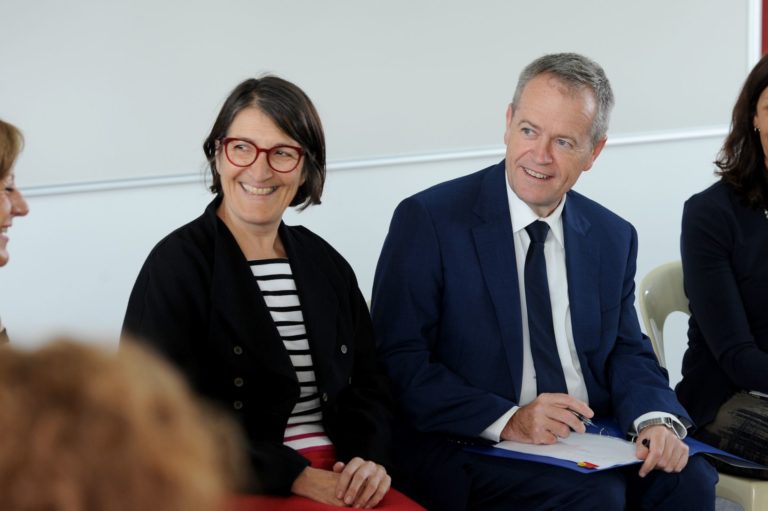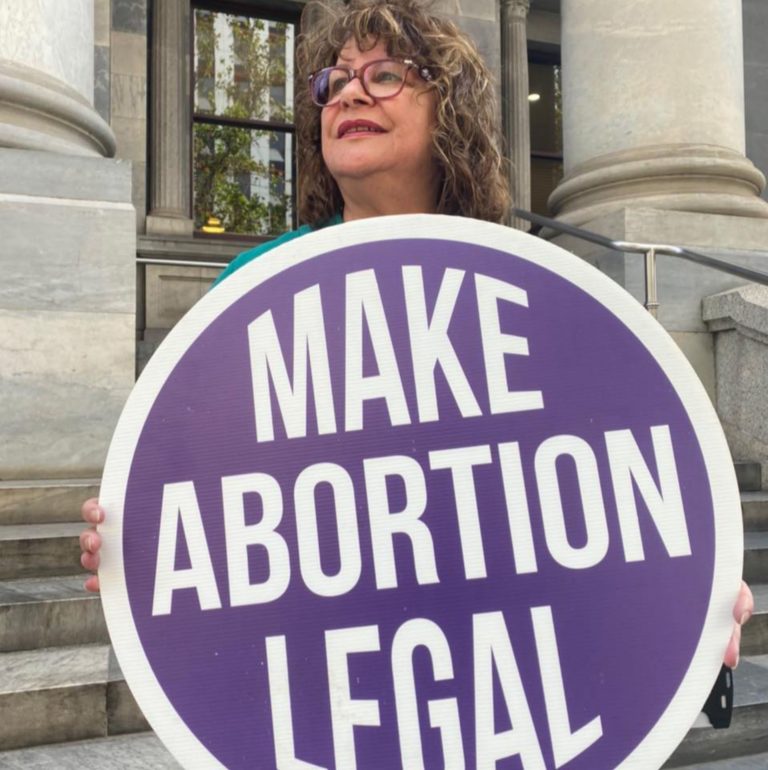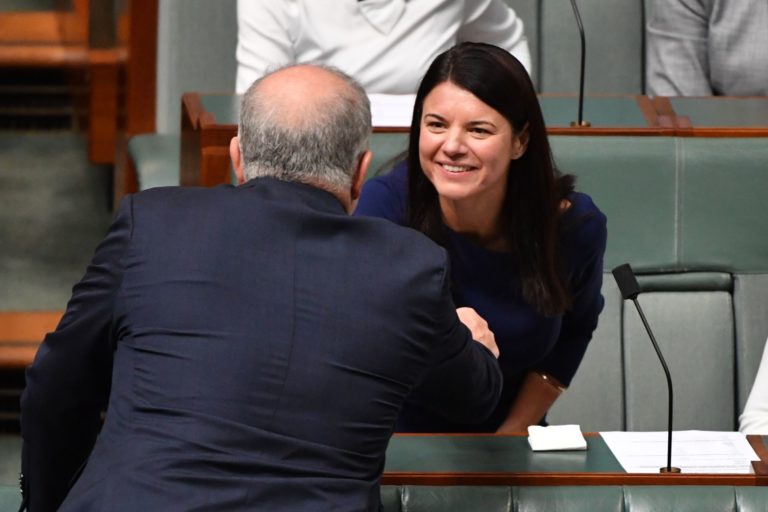Australia’s Parliament is experiencing its #metoo moment with rape allegations, however “revelations” of a toxic culture are not exactly new.
Sophie Cotsis MP, NSW Shadow Minister, told Neos Kosmos that “the way politics has been done in Australia for the last 200 years is dominated by the way men do business”.
She points to the very structure of the “chambers which are designed for men” with long sitting hours and only recently did they get a parents room to “accommodate mothers for them to continue their contribution”.
Rampant sexism
Putting aside rape accusations currently dominating the spotlight, Ms Cotsis points to the little, insidious ways in which female politicians experience sexism.
“I think women are targeted by what they are wearing or the way they look. They are constantly being asked, ‘who is looking after your children’. I’ve never heard any male being asked who was looking after the children,” she said – a question Kat Theophanous, Victoria’s member for Northcote, said she knows all too well.

“That question,” Ms Theophanous laughed. “I’m no different to any other parent juggling a career with child caring responsibilities. We need to stop asking women how they can manage a family with a career, and we need to start asking how our workplaces, work practices and work culture can be safe and equal for women. I entered politics not in spite of my children but for them, because ultimately I want to contribute to a community where every person and where my two daughters are valued.”
The sacrifices for women are many, Ms Cotsis said.
“We have to also be mindful of the cyber bullying and the negative effects of what is written on social media and how horrifying this is. We want to see more women in politics, but women seeing other women getting attacked and ripped apart are just not going to enter the world of politics. And so the culture continues.”
READ MORE: Chanel Contos calls for consent to be added to curriculum earlier
“Nothing shocks me,” Labor member of the South Australian Legislative Council Irene Pnevmatikos told Neos Kosmos. “But it saddens me that what we are hearing about now could act as a disincentive when women need to be more visible to bring about change that will accommodate both men and women in our system.”
Ms Theophanous said, “Politics isn’t immune to structural, social and economic issues we face as a society. It is hard to say if it is more prevalent in politics, but we still have a long way to go before we can achieve equality in the political realm.”

Maria Vamvakinou MP said “most of the public response to the events of the last few weeks has been to affirm how nasty politics is and to wonder why on earth anyone in their right mind would contemplate a career in politics,” she said. “I have certainly not experienced such dismay in all the years I have been in federal parliament.”
This week’s damning inquiry into harassment in South Australia’s State Parliament uncovered shocking allegations of indecent exposure, assault and sexual suggestions by MPs and their staff.
Ms Pnevmatikos said the investigation conducted by former acting Equal Opportunity commissioner Emily Strickland has made 16 recommendations to combat bad behaviour within the corridors of Parliament House, and in ministerial and MPs’ electorate offices.
The report concluded that “sexual and discriminatory harassment is prevalent in the parliamentary workplace”.
READ MORE: Prof Vasso Apostolopoulos is the special guest speaker on International Womens’ Day event
“Six interview participants and two participants who made written submissions described being victims of sexual harassment in the last five years, and all of those alleged incidents involved either members of parliament or staff of members of parliament as perpetrators,” the report read with “allegations of harassment ranging in seriousness and included sexually suggestive and unwelcome comments, indecent exposure, and physical assault.”
“Incidents of unwelcome touching, such as on backsides”, as well as reports of people “indecently touching themselves” and one male exposed himself in front of co-workers, were among issues raised in the inquiry which Ms Pnevmatikos hopes will bring about positive change.

Surviving the ‘boys club’
Ms Cotsis said she’s managed to survive by having a “thick skin”, and Ms Vamvakinou said she keeps her eyes on the goal.
“Usually I talk about all the potential you have as a member of parliament to make a difference, I encourage young people, especially young women to aspire to a career in politics, and despite the ugliness at play at the moment, I know that the potential to make a difference will prevail, so I will continue to encourage more women to enter politics so that we can continue to grow the diversity of our representation because the alternative will be a loss to the community and detrimental to the advancement of the collective good,” Ms Vamvakinou told Neos Kosmos.
“To a newcomer I would say that public office will have its challenges, it will require sacrifices and adjustments, but if you are clear about why you have chosen a career of public office then you will have opportunities to make a difference and to shape decisions that will affect the lives of the people you represent because politics is full of potential and possibilities. This is exciting and rewarding.”
Ms Theophanous, whose father Theo Theophanous was also a former government minister, said she entered politics with her eyes wide open. “I wasn’t deterred by the sexism,” she said. “My message to young women and girls is that ‘you are powerful agents of change, your voices and your perspectives matter and we need you in the halls of power’,” she said.
READ MORE: 40 women living in Australia recount their life story ‘like a fairy tale’
In Australia now, 1 woman each week dies as a result of domestic violence.
That’s why it’s important for us to create a future where the leaders inspires the next generation to advocate for change.
Respect for women starts at the top – with our leaders. #IWD2021 pic.twitter.com/VG4LX8n13a
— Shannon Fentiman (@ShannonFentiman) March 5, 2021
Dr Fiona Barbouttis Martin MP pointed to the words of Australian of the Year, Grace Tame, who said, “We can’t fix a problem we don’t discuss. And, it begins with a conversation.”
Dr Martin said, “I am concerned by the culture of Parliament House and its impact on the safety of women. I will continue to use my professional background as a catalyst for change within our Parliament and across the country. We have come a long way, but still have further to go.
“For a fair and just society to function, we must attract, maintain and develop a strong representation of women in positions of senior leadership, both in politics and the corporate sector.”

But it’s a Catch-22 situation as women who speak out against sexism to get the “conversation” rolling find themselves marginalised, discouraging others to follow their brave example. When South Australian Best MP Connie Bonaros found herself backslapped by a Liberal MP at a Christmas party she spoke up and received a public apology by Liberal MP Sam Duluk, who was also suspended from his post. The backlash she received however so enormous that she said going to work was “humiliating and distressing” as she was shunned by members of the Liberal Party following her accusations.
During an emotional address, Ms Bonaros spoke of the “media frenzy” at the time and how it impacted her work and family.
All parliamentarians Neos Kosmos spoke with agreed that there’s one way to change attitudes and that is by getting more women in power.
Ms Theophanous said she is “really proud of the Andrews government commitment to gender equality” and ensuring women’s voices are heard.
“We have the state’s first majority of women which make up 48 per cent of our party room – an extraordinary shift,” she said, while pointing to various government initiatives in protecting women against violence and other efforts. “It is Labor governments that have continued to fight tooth and nail to save civil liberties, equal pay, paid parental leave…. That is what Labor governments are about.”
READ MORE: SA Best MP Connie Bonaros speaks up in Parliament over the impact assault has had on her

While gender quotas are often criticised as being gender biased, Ms Pnevmatikos said, “You can turn the argument in reverse and say men may get a job because they are men. The truth is, you should get a job based on merit, but at the moment changes are slow and quotas are necessary so that those holding seats of power reflect the make-up of the population.”
Ms Vamvakinou said that some women’s issues cross party lines. “As parliamentarians we come together to support each other on advocating for issues affecting women, for example the campaign for funding to conduct research into endometriosis, unanimous support for raising awareness on domestic violence and other issues that we share a common ground on,” she said, “but the adversarial, partisan nature of our political system makes it difficult for female MPs across the political spectrum to come together to vote as a Block on the floor of the parliament!”
Ms Theophanous, however, states that “women aren’t always a homogenous group either”, while Ms Pnevmatikos said “we can’t achieve change on our own as women”.
“It is a societal problem, a community problem,” Ms Pnevmatikos said. “There are a number of men also making a contribution to bring about change.”
Unfortunately, the moments of glory for women’s issue in the “boys club” of politics are too often overshadowed by sexist attitudes.
Bullying & harassment is widespread in our public health system. A recent survey revealed 1 in 3 docs in training reported experiencing &/or witnessing bullying, harassment or discrimination last year. @sasmoa4doctors https://t.co/9WNydSWePY
— Connie Bonaros (@ConnieBonaros) March 3, 2021
When Labor MP Jenny Mikakos resigned from her post as Victoria’s health minister, the comments on social media were atrocious – a large number of them gender based. A year earlier, another Greek Australian MP Julia Banks, bowed out of the Liberal party, lashing out at political “haters” decrying the “tribalism and toxic culture” of her former party.
The most notorious case of sexism, however, was the treatment of Australia’s first woman prime minister Julia Gillard, who – throughout her term – received criticism from both her party and opposition. There were threatening protest signs, sexist attacks by fellow parliamentarians, vulgar cartoons and even a dish on the menu at the Liberal National Party fundraiser described as “Julia Gillard Kentucky Fried Quail – small breasts, huge thighs and a big red box”. In retaliation for all she had to endure, Ms Gillard’s sexism and misogyny speech was a watershed moment in Australian politics as it cast the spotlight on the “boys club” of politics.
That was 2012, and in 2021 very little has changed as far as a toxic culture against women wielding political power are concerned.